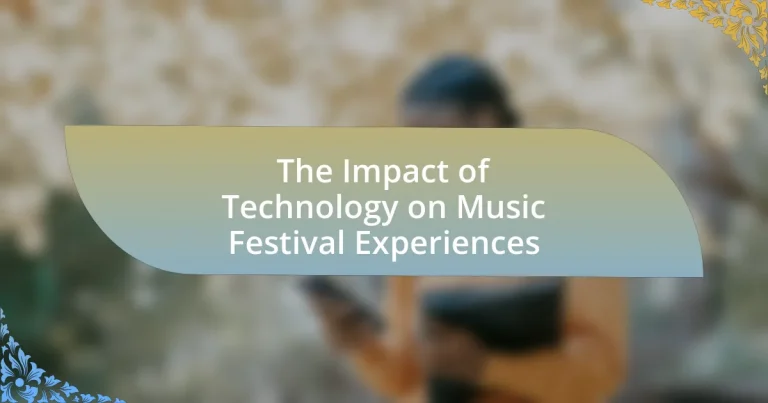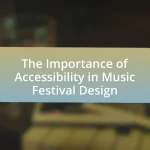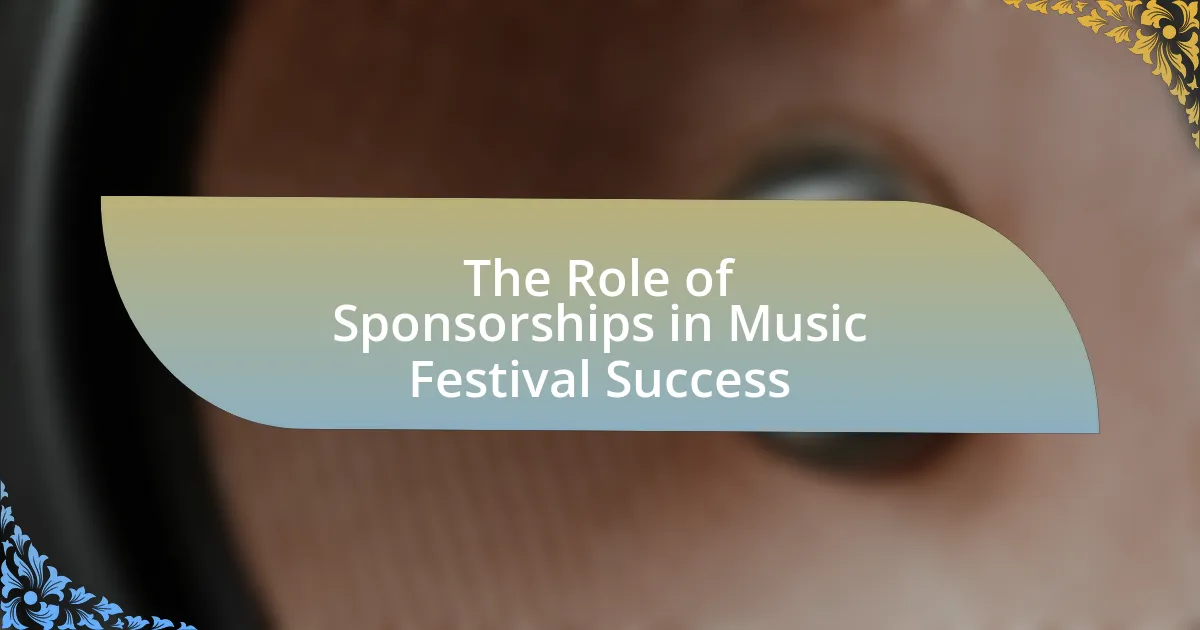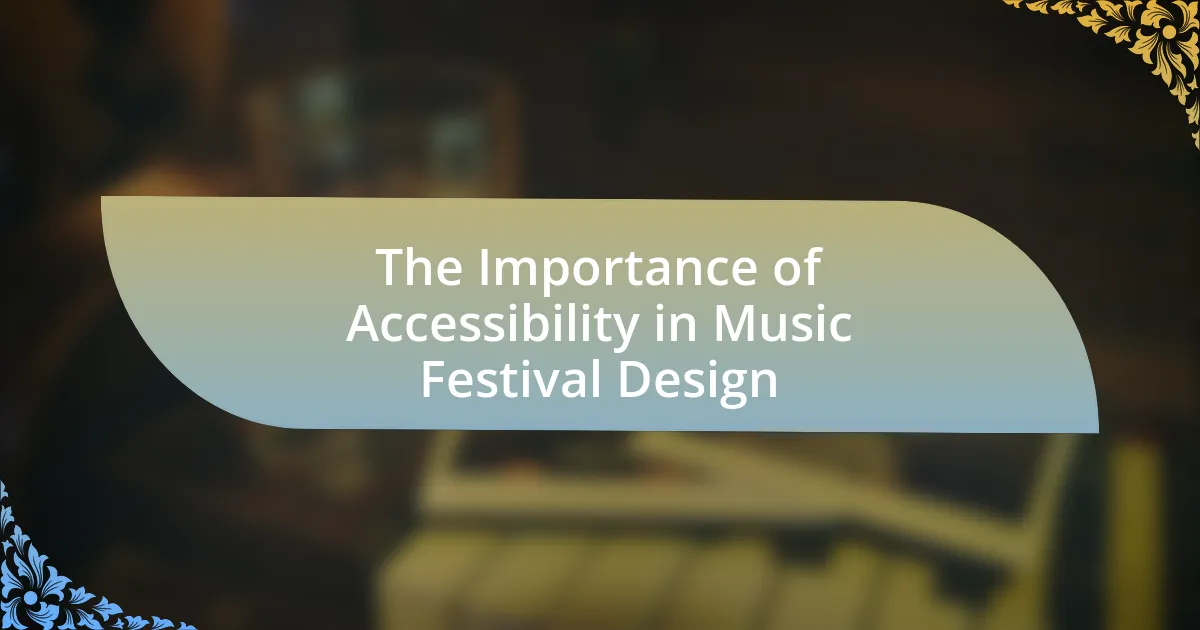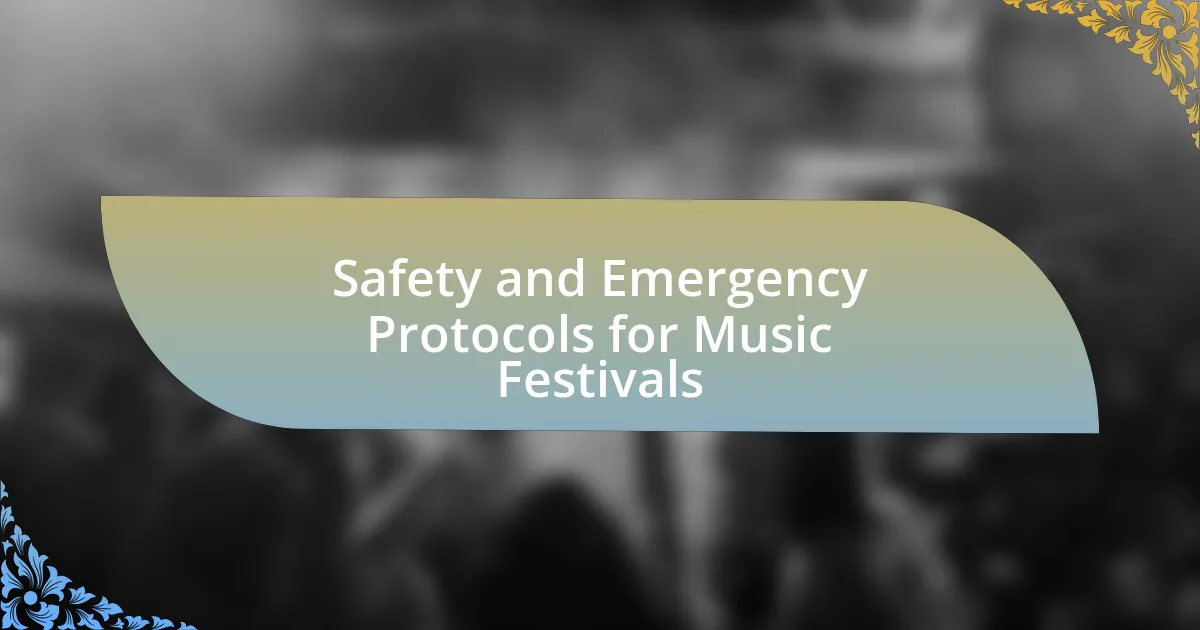The article examines the significant impact of technology on music festival experiences, highlighting enhancements in engagement, accessibility, and enjoyment. It discusses how live streaming, mobile apps, and advancements in sound and lighting technology have transformed both attendee experiences and festival organization. Key topics include the role of mobile applications in improving navigation, the use of RFID technology for security and efficiency, and the integration of data analytics for tailored experiences. Additionally, the article addresses challenges such as connectivity issues and cybersecurity threats, while exploring future trends like virtual reality and artificial intelligence in festival planning and execution.
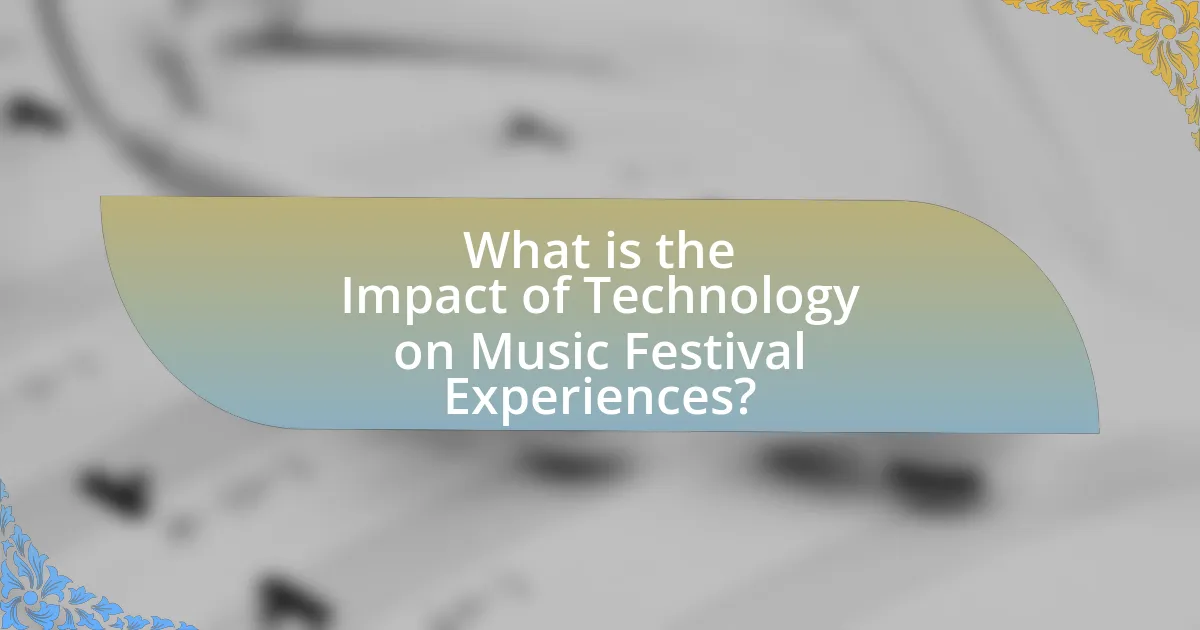
What is the Impact of Technology on Music Festival Experiences?
The impact of technology on music festival experiences is profound, enhancing engagement, accessibility, and overall enjoyment. Technology facilitates live streaming, allowing remote audiences to participate in festivals, which has been evidenced by events like Coachella, where millions view performances online. Additionally, mobile apps provide real-time information on schedules, artist lineups, and venue maps, improving navigation and planning for attendees. Furthermore, advancements in sound and lighting technology create immersive environments, elevating the sensory experience for festival-goers. Data from the 2022 Electric Daisy Carnival indicated that 70% of attendees used festival apps, highlighting the integration of technology in enhancing the overall experience.
How has technology transformed the way music festivals are organized?
Technology has significantly transformed the organization of music festivals by streamlining logistics, enhancing attendee engagement, and improving safety measures. Event organizers now utilize advanced software for ticketing, scheduling, and resource management, which increases efficiency and reduces operational costs. For instance, platforms like Eventbrite and Ticketmaster allow for real-time ticket sales and data analytics, enabling organizers to make informed decisions based on attendee behavior. Additionally, mobile apps enhance the festival experience by providing attendees with schedules, maps, and interactive features, fostering greater engagement. Furthermore, technologies such as RFID wristbands improve security and streamline entry processes, as seen in festivals like Coachella, where RFID technology has reduced wait times and enhanced cashless transactions. These advancements illustrate how technology has reshaped the organizational landscape of music festivals, making them more efficient and enjoyable for both organizers and attendees.
What technological advancements have been implemented in festival planning?
Technological advancements in festival planning include the use of mobile apps, RFID technology, and data analytics. Mobile apps enhance attendee experience by providing real-time information on schedules, maps, and artist lineups, which improves engagement and navigation. RFID technology streamlines entry processes and cashless transactions, reducing wait times and enhancing security. Data analytics allows organizers to gather insights on attendee behavior and preferences, enabling more tailored experiences and efficient resource allocation. These advancements have been adopted widely, with many festivals reporting increased attendance and satisfaction rates as a result.
How do these advancements improve logistical efficiency?
Advancements in technology improve logistical efficiency by streamlining operations, enhancing communication, and optimizing resource allocation. For instance, the use of real-time data analytics allows festival organizers to monitor crowd movements and adjust staffing levels accordingly, reducing wait times and improving attendee experience. Additionally, mobile applications facilitate instant communication between vendors, security, and event staff, ensuring quick responses to any issues that arise. Furthermore, automated inventory management systems help track supplies and equipment, minimizing waste and ensuring that resources are available when needed. These technological improvements lead to a more organized and responsive logistical framework, ultimately enhancing the overall efficiency of music festival operations.
What role does technology play in enhancing attendee experiences at music festivals?
Technology significantly enhances attendee experiences at music festivals by providing improved connectivity, interactive features, and personalized services. For instance, mobile apps allow attendees to access real-time information about schedules, artist lineups, and venue maps, which facilitates better planning and navigation. Additionally, technologies such as RFID wristbands streamline entry processes and enable cashless transactions, reducing wait times and enhancing convenience. A study by Eventbrite in 2019 found that 70% of festival-goers prefer using mobile apps for event information, highlighting the importance of technology in shaping their experiences. Furthermore, social media integration allows attendees to share their experiences instantly, fostering a sense of community and engagement. Overall, technology plays a crucial role in making music festivals more enjoyable and efficient for attendees.
How do mobile apps contribute to festival-goers’ experiences?
Mobile apps significantly enhance festival-goers’ experiences by providing real-time information, facilitating social interactions, and offering personalized schedules. These applications allow attendees to access schedules, maps, and artist information instantly, which improves navigation and planning. For instance, a study by Eventbrite found that 70% of festival-goers use mobile apps to stay informed about event schedules and changes, leading to a more organized experience. Additionally, mobile apps often include social features that enable users to connect with friends, share experiences, and discover new artists, fostering a sense of community among attendees.
What impact do social media platforms have on festival engagement?
Social media platforms significantly enhance festival engagement by facilitating real-time communication and community building among attendees. These platforms allow festival-goers to share experiences, photos, and videos instantly, creating a sense of connection and excitement that can lead to increased attendance and participation. For instance, a study by Eventbrite found that 80% of festival attendees share their experiences on social media, which not only promotes the event but also influences others to attend. Additionally, social media enables organizers to engage with their audience through targeted marketing, live updates, and interactive content, further driving engagement and enhancing the overall festival experience.
How does technology influence the performance aspect of music festivals?
Technology significantly enhances the performance aspect of music festivals by enabling advanced sound systems, visual effects, and interactive experiences. High-quality audio equipment ensures that sound is distributed evenly across large crowds, improving the overall listening experience. For instance, festivals like Coachella utilize state-of-the-art sound technology, which has been shown to increase audience satisfaction and engagement. Additionally, visual technology, such as LED screens and light shows, creates immersive environments that captivate attendees, as evidenced by the use of synchronized visuals at events like Tomorrowland. Furthermore, technology facilitates live streaming, allowing performances to reach global audiences, thereby expanding the festival’s reach and impact. This integration of technology not only elevates the performance quality but also transforms the way audiences interact with the music and artists.
What are the latest innovations in sound and lighting technology used at festivals?
The latest innovations in sound and lighting technology used at festivals include advanced spatial audio systems and dynamic LED lighting setups. Spatial audio technology, such as Dolby Atmos, creates an immersive sound experience by allowing sound to move in three-dimensional space, enhancing audience engagement. Dynamic LED lighting systems, including pixel mapping and automated fixtures, enable synchronized light shows that respond to music in real-time, creating visually stunning environments. These innovations have been adopted by major festivals like Coachella and Tomorrowland, demonstrating their effectiveness in elevating the overall festival experience.
How do live streaming and virtual reality change the way performances are experienced?
Live streaming and virtual reality significantly transform performance experiences by providing immersive and accessible viewing options. Live streaming allows audiences to engage with performances in real-time from remote locations, expanding reach beyond physical venues; for instance, events like Coachella have utilized live streaming to attract millions of online viewers globally. Virtual reality enhances this experience by creating a 360-degree environment that simulates being at the event, allowing users to feel present and interact with the performance in a way that traditional viewing cannot replicate. Research by the International Journal of Human-Computer Interaction indicates that VR can increase emotional engagement and satisfaction among users, demonstrating its effectiveness in enhancing performance experiences.

What are the challenges associated with technology in music festivals?
The challenges associated with technology in music festivals include issues such as connectivity problems, equipment failures, and cybersecurity threats. Connectivity problems arise due to high demand for mobile data and Wi-Fi, often leading to poor service for attendees. Equipment failures can disrupt performances and impact sound quality, as seen in incidents where technical malfunctions have caused delays or cancellations. Cybersecurity threats pose risks to personal data and payment systems, with reports indicating that music festivals have been targeted by hackers seeking to exploit vulnerabilities in ticketing and payment platforms. These challenges highlight the need for robust technological infrastructure and security measures to enhance the overall festival experience.
What security concerns arise from the use of technology at festivals?
The primary security concerns arising from the use of technology at festivals include data privacy breaches, cyberattacks, and the potential for unauthorized access to sensitive information. Data privacy breaches can occur when personal information collected through ticketing apps or RFID wristbands is inadequately protected, leading to identity theft or misuse of data. Cyberattacks, such as Distributed Denial of Service (DDoS) attacks, can disrupt festival operations and compromise safety measures. Additionally, the use of surveillance technology raises concerns about unauthorized monitoring and the erosion of attendee privacy. These issues highlight the need for robust cybersecurity measures and transparent data handling practices to protect festival-goers.
How can data privacy issues affect festival attendees?
Data privacy issues can significantly affect festival attendees by exposing their personal information to unauthorized access and misuse. When attendees share data for ticket purchases, mobile app usage, or on-site services, they risk having sensitive information, such as contact details and payment information, compromised. A study by the Ponemon Institute found that 60% of consumers are concerned about their personal data being misused at events, indicating a widespread apprehension that can lead to decreased attendance and engagement. Furthermore, incidents of data breaches at festivals can result in identity theft, financial loss, and a loss of trust in event organizers, ultimately impacting the overall festival experience.
What measures can be taken to enhance security while using technology?
To enhance security while using technology, implementing multi-factor authentication is essential. This measure significantly reduces the risk of unauthorized access by requiring users to provide two or more verification factors, such as a password and a one-time code sent to their mobile device. According to a study by the Cybersecurity & Infrastructure Security Agency, multi-factor authentication can block up to 99.9% of automated attacks, demonstrating its effectiveness in safeguarding sensitive information. Additionally, regular software updates and security patches are crucial, as they address vulnerabilities that could be exploited by cybercriminals. The National Institute of Standards and Technology emphasizes that keeping systems updated is a fundamental practice for maintaining security integrity.
How does technology impact the environmental sustainability of music festivals?
Technology enhances the environmental sustainability of music festivals by enabling efficient resource management and reducing waste. For instance, advancements in renewable energy sources, such as solar and wind power, allow festivals to operate with minimal carbon footprints. A study by the Green Music Initiative found that festivals utilizing solar energy can reduce greenhouse gas emissions by up to 80%. Additionally, digital ticketing and cashless payment systems minimize paper waste and streamline operations, further contributing to sustainability efforts. Smart waste management technologies, including real-time monitoring systems, help optimize recycling and composting processes, significantly decreasing landfill contributions.
What are the ecological footprints of technological implementations?
Technological implementations have significant ecological footprints, primarily through energy consumption, resource extraction, and waste generation. For instance, the production and operation of sound systems, lighting, and digital screens at music festivals require substantial electricity, often sourced from fossil fuels, contributing to greenhouse gas emissions. A study by the Green Music Initiative found that a typical music festival can generate up to 1,000 tons of CO2 emissions, largely from energy use. Additionally, the manufacturing of electronic devices involves mining for rare earth metals, which can lead to habitat destruction and pollution. Furthermore, the disposal of outdated technology contributes to electronic waste, which is often not recycled properly, leading to soil and water contamination. These factors collectively illustrate the ecological impact of technology in the context of music festivals.
How can technology be used to promote sustainability at festivals?
Technology can promote sustainability at festivals through the implementation of digital ticketing systems, waste management apps, and renewable energy sources. Digital ticketing reduces paper waste and streamlines entry processes, while waste management apps help attendees locate recycling and composting stations, significantly improving waste diversion rates. Additionally, the use of solar panels and wind turbines at festivals can provide clean energy, reducing the carbon footprint associated with traditional power sources. For instance, the Coachella Valley Music and Arts Festival has successfully integrated solar energy, demonstrating a commitment to sustainability while enhancing the overall festival experience.
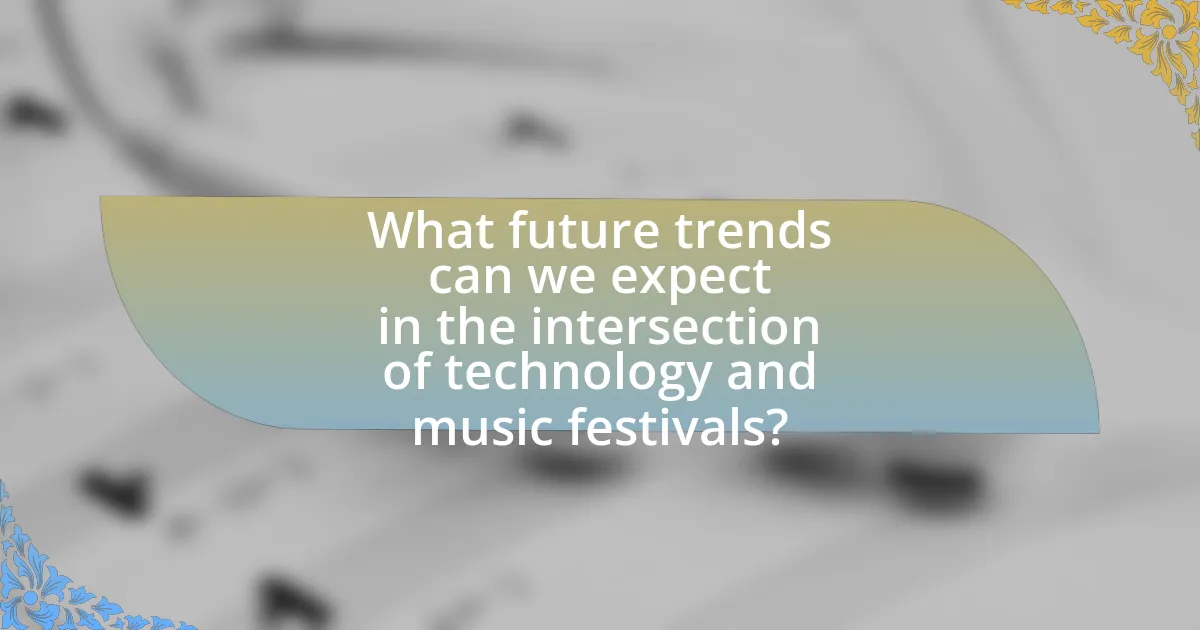
What future trends can we expect in the intersection of technology and music festivals?
Future trends in the intersection of technology and music festivals include the increased use of virtual reality (VR) and augmented reality (AR) to enhance attendee experiences. As evidenced by the rise of virtual festivals during the COVID-19 pandemic, platforms like Fortnite and Roblox successfully hosted music events, attracting millions of viewers and demonstrating the potential for immersive experiences. Additionally, advancements in mobile technology and apps will facilitate personalized festival experiences, allowing attendees to customize schedules and interact with artists in real-time. The integration of blockchain technology for ticketing will also enhance security and transparency, reducing fraud and scalping. These trends indicate a shift towards more interactive, secure, and personalized music festival experiences driven by technological innovation.
How might emerging technologies shape the future of music festival experiences?
Emerging technologies will significantly enhance music festival experiences by integrating virtual reality, augmented reality, and advanced data analytics. Virtual reality can create immersive environments that allow attendees to experience performances from unique perspectives, while augmented reality can provide interactive elements, such as real-time information about artists and schedules through mobile devices. Advanced data analytics can optimize crowd management and personalize attendee experiences by analyzing preferences and behaviors, leading to tailored recommendations for activities and performances. For instance, festivals like Coachella have already begun utilizing these technologies to improve engagement and streamline operations, demonstrating their potential impact on future events.
What role will artificial intelligence play in festival planning and execution?
Artificial intelligence will play a crucial role in festival planning and execution by enhancing operational efficiency and improving attendee experiences. AI can analyze vast amounts of data to optimize scheduling, resource allocation, and crowd management, ensuring that festivals run smoothly. For instance, predictive analytics can forecast attendance patterns, allowing organizers to adjust staffing and logistics accordingly. Additionally, AI-driven chatbots can provide real-time assistance to attendees, answering queries and offering personalized recommendations, which enhances overall satisfaction. The integration of AI technologies has been shown to reduce costs and improve decision-making processes in event management, as evidenced by case studies from festivals that have successfully implemented these tools.
How could advancements in augmented reality enhance attendee interactions?
Advancements in augmented reality (AR) could significantly enhance attendee interactions by providing immersive experiences that facilitate real-time engagement and personalized content delivery. For instance, AR can enable festival-goers to access interactive maps, view artist information, and participate in gamified experiences through their smartphones or AR glasses. This technology allows attendees to visualize performances, interact with digital art installations, and connect with other festival-goers in innovative ways. Research indicates that events utilizing AR have seen increased attendee satisfaction and engagement, as evidenced by a study published in the Journal of Event Management, which found that 75% of participants reported a more memorable experience when AR was integrated into the event.
What best practices should festival organizers adopt regarding technology use?
Festival organizers should adopt best practices such as implementing robust ticketing systems, utilizing mobile apps for real-time updates, and ensuring reliable Wi-Fi connectivity. These practices enhance attendee experience by streamlining entry processes, providing essential information, and facilitating communication. For instance, a study by Eventbrite found that 70% of festival-goers prefer using mobile apps for schedules and updates, indicating a strong demand for digital engagement. Additionally, ensuring data security and privacy is crucial, as breaches can lead to loss of trust; according to a report by IBM, the average cost of a data breach is $3.86 million. By focusing on these technology practices, festival organizers can significantly improve operational efficiency and attendee satisfaction.
How can organizers ensure a seamless integration of technology for attendees?
Organizers can ensure a seamless integration of technology for attendees by implementing user-friendly platforms and reliable connectivity solutions. For instance, providing a dedicated mobile app that offers real-time updates, schedules, and interactive maps enhances attendee engagement and navigation. Additionally, ensuring robust Wi-Fi coverage throughout the venue minimizes connectivity issues, allowing attendees to share their experiences instantly. Research indicates that 70% of festival-goers prefer using mobile apps for information, highlighting the importance of technology in enhancing the overall experience. By prioritizing these technological solutions, organizers can significantly improve attendee satisfaction and engagement at music festivals.
What strategies can be employed to balance technology and the live music experience?
To balance technology and the live music experience, event organizers can implement strategies such as integrating augmented reality (AR) for enhanced audience engagement while maintaining the authenticity of live performances. For instance, using AR can provide interactive elements that complement the music without overshadowing the live act itself. Additionally, limiting the use of large screens and encouraging attendees to experience the performance directly rather than through their devices can enhance the live atmosphere. Research indicates that 70% of festival-goers prefer immersive experiences that do not detract from the live performance, highlighting the importance of maintaining a focus on the artists and the music.
